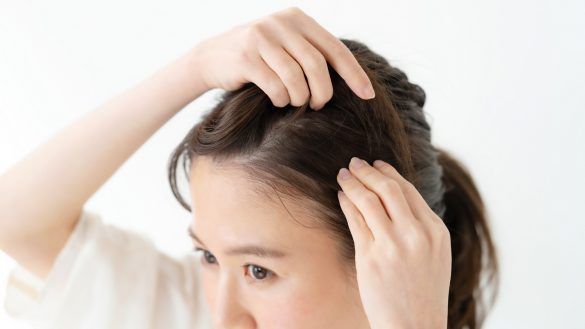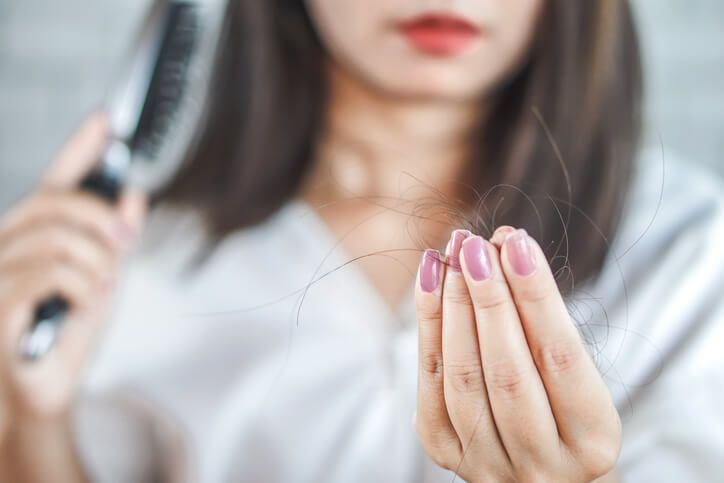
- Home
- Trend
- Weight Loss Strategies
- Acne Tips
- Hair Health Information
- Blemish Removal Tips
- Acne Scar Removal Tips
- Muscle Building Techniques
- Intimate Care Tips
- Postpartum Intimate Care
- Eye Bags Wiki
- Tips for Face Slimming
- Secret of Permanent Hair Removal
- Breast Enlargement Tips
- Cure to Snoring
- Marionette Lines
- Skin-Tightening Secrets
Watching your once full head of hair fall out and worrying you might be experiencing hair loss? You're not alone—female hair loss is more common than many think. But how can you effectively manage and improve it? Let’s dive into practical ways to tackle hair thinning.
Do I Really Have Hair Loss? Yes—Even Young People Can Experience It!

Every woman dreams of having thick, healthy locks, yet hair loss can sneak up on you. So, how do you know when it's time to take action?
A healthy adult typically has 100,000–150,000 strands of hair. Around 10% are in the shedding phase at any given time, meaning it's normal to lose up to 100 strands per day. But if you’re suddenly losing more than that—hair falling out in clumps or with just a light touch—you may be in the early stages of hair loss.
Even young women can be affected. Modern lifestyle stressors like heavy workloads, lack of sleep, poor diet, and insufficient exercise can all slow your metabolism and negatively impact your scalp and hair follicle health. Frequent coloring and heat styling further weaken hair, making it more prone to breakage.
What Hair Loss Symptoms Should Women Watch Out For?

Many women become concerned about hair loss as they approach middle age and may quickly seek out remedies. While men typically deal with receding hairlines or bald patches, women tend to experience more subtle symptoms—like a widening part, thinning at the crown, or hair becoming increasingly fragile and breaking easily.
Don’t ignore these signs! Women can also suffer from androgenetic alopecia (female pattern baldness), especially after menopause or due to hormone imbalances. Elevated androgen levels can lead to the hormone DHT attacking hair follicles, causing them to shrink and weaken, making it harder to hold onto hair.
Typical signs include hair loss around the temples, a receding hairline, or a widening part. If you spot these, pay close attention!
Also, don’t overlook your scalp. An oily scalp, dandruff, or itchiness are warning signs of underlying problems. Healthy hair starts with a healthy scalp—nourished follicles produce strong, resilient hair.
免費體驗
F8 Hair Regrowth Treatment
1 Minute Self-Registration
Date should not be before minimal date
Hair Loss from a TCM Perspective
Traditional Chinese Medicine (TCM) views hair loss as a reflection of internal imbalances—often due to liver and kidney deficiencies, spleen dampness, or poor circulation. Treatment focuses on restoring harmony and nourishing the blood to revitalize the scalp and follicles.
As the TCM saying goes: “The liver stores blood, and hair is the surplus of blood. Hair loss is the depletion of blood.” This means blood and qi are essential to healthy hair growth, and the liver plays a key role in regulating this.
Late nights, poor sleep, and stress compromise liver function and detoxification. This blocks blood flow to the scalp and reduces vital nutrients needed by follicles—weakening hair over time and increasing breakage and shedding.
What Causes Female Hair Loss According to Western Medicine?
Western medicine identifies three main causes of female hair loss: genetics, lifestyle habits, and hormonal imbalances.
Hereditary hair loss is one of the most difficult to treat. If hair thinning runs in your family, you may start experiencing it earlier than others.
But regardless of the type, most cases can be traced back to the following three triggers:
1. Stress-Related Hair Loss
Chronic stress or emotional turmoil can disrupt hormone levels, leading to hair shedding. Stress tightens scalp muscles, restricts blood flow, and reduces nutrient delivery to follicles—weakening hair and leading to fallout.
2. Poor Diet and Nutrition
Fast food, takeout, and high-salt, high-fat, and fried foods can increase oil production and clog hair follicles. On the other hand, crash dieting or not eating enough can deprive your body of key nutrients—especially protein, iron, vitamins, and carbs—causing dull, brittle hair and eventual hair loss.
3. Damage from Hairstyling
Frequent dyeing, perming, or tight hairstyles (like slicked-back buns) expose your scalp to harsh chemicals and mechanical stress. This can damage follicles, delay recovery, and even permanently affect hair regrowth if follicles are repeatedly traumatized.
Daily Habits to Help Reduce Hair Loss
So what can you do to start improving hair loss? Here are five simple daily habits that can make a big difference:
1. Scalp Massage
Doctors often suggest scalp massage to improve blood circulation and stimulate growth. Some Japanese practitioners also believe stiff neck muscles restrict blood flow to the head.
Try this massage routine (no tools needed!):
• Step 1: Use your palms to massage the top of your head in circular motions for 10 seconds.
• Step 2: Place both palms on the sides of your head and massage in small circles for 10 seconds.
• Step 3: Use four fingers to gently move the skin along the sides of your neck for 10 seconds.
• Step 4: Massage just above your collarbone for 10 seconds to aid detoxification.
2. Get Enough Sleep
Sleep is critical for body repair. In TCM, nighttime is when the liver detoxifies and regenerates. Staying up late can disrupt this, reducing blood supply to the scalp and triggering hair loss. Want to protect your hair? Start by going to bed earlier!
3. Eat Hair-Friendly Foods
Protein strengthens hair, so eat more salmon, eggs, dairy, soy, and seafood. Iron-rich foods like beef, spinach, shrimp, and black beans help produce red blood cells, improving oxygen delivery to your follicles and enhancing hair growth.
4. Wash Your Hair Properly
Avoid scratching your scalp with nails. Use your fingertips instead to massage gently. Always lather shampoo in your hands first before applying it to your hair. Never apply conditioner directly to the roots—this can clog follicles and worsen hair loss.
5. Brush Daily
Brushing stimulates scalp circulation, promoting healthy hair growth. Just be sure to use a wide-toothed or soft-tipped brush to avoid irritating the scalp.
免費體驗
F8 Hair Regrowth Treatment
1 Minute Self-Registration
Date should not be before minimal date
5 Things NOT to Do—They Might Make Hair Loss Worse!
1. Using Random Hair Growth Products
Not all over-the-counter products are safe or effective. Some may contain harsh chemicals that irritate the scalp or damage follicles. Without clinical backing, they could end up doing more harm than good.
2. Avoiding Medical Help
Don’t wait too long to seek treatment. Ignoring early signs may lead to irreversible damage, such as follicle atrophy. The sooner you address the cause, the better your chance of recovery.
3. Trusting Unproven Home Remedies
From rubbing raw ginger to washing with brandy or eating black sesame seeds, DIY treatments lack scientific support. Some may even be irritating or unsanitary, worsening hair loss instead of improving it.
4. Overstressing
Stress is a major factor in hair loss. Being overly anxious or emotionally suppressed can disrupt blood flow to the scalp and derail recovery efforts.
5. Using the Wrong Products
Each person’s scalp and hair type is different. Using products that aren’t tailored to your needs could aggravate the problem. It’s important to choose treatments based on your specific hair condition.
How to Prevent Hair Loss?
You’ve heard it before—prevention is better than cure. Here’s how to protect your hair before the problem begins:
1. Keep Your Scalp Clean
Excess oil buildup can clog follicles and cause scalp acne. Deep cleanse your scalp at least once a week to prevent seborrheic dermatitis and promote healthy hair growth.
2. Minimize Chemical Treatments and Tension
Frequent perming or coloring weakens your scalp and strands. Tight hairstyles also strain the roots, making hair brittle and more likely to fall out. Give your hair regular breaks to stay healthy.
3. Manage Stress Effectively
TCM believes emotions reflect directly in hair health. Activities like exercise, reading, or hobbies can help release stress and maintain scalp vitality.
Which Hair Loss Treatment Works Best? Try Laser Therapy
With so many hair loss treatments on the market, it can be hard to choose. Look for options that are effective, targeted, and safe.
Perfect Medical’s F8 Hair Regrowth Treatment uses FDA-approved low-level laser technology to boost hair growth. It promotes scalp circulation, restores follicle health, and balances oil production.
Each treatment includes a scalp analysis by a hair specialist to determine your root cause and tailor a personal growth plan—ensuring targeted results.
Act early to save your hair! Perfect Medical is offering free trial sessions and complimentary professional scalp analysis with a quick 1-minute sign-up. Don’t wait until it’s too late!
Try it Today: Perfect Medical F8 Hair Regrowth Treatment免費體驗
F8 Hair Regrowth Treatment
1 Minute Self-Registration
Date should not be before minimal date
FAQ

Can women have male-pattern baldness?
Yes. Post-menopausal women or those with hormonal imbalances are at higher risk. Symptoms include thinning at the hairline or temples, and a widening part. Monitor closely if you notice these.
Why do young people also lose hair?
Poor lifestyle habits like stress, lack of sleep, poor diet, and frequent chemical treatments can damage follicles and slow metabolism—leading to hair loss even at a young age.
What signs of hair loss should I look out for?
Daily hair loss over 100 strands, noticeable thinning, brittle texture, or a receding hairline may signal early-stage hair loss.
How does stress affect hair loss?
Stress affects hormone balance and blood circulation to the scalp. Managing emotions and reducing stress can significantly support hair regrowth.
Can I use OTC hair growth products?
Be cautious. Many contain unknown chemicals or lack clinical backing. Using the wrong product can worsen scalp health and hair loss.








